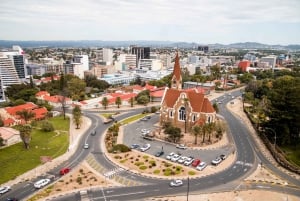Government
The Constitution adopted on 9 February 1990 established Namibia as a "sovereign secular, democratic and unitary State founded upon the principles of democracy. Under the Constitution executive authority rests with the President . Legislative power is vested in the National Assembly with 78 members, 72 of whom are elected for five years while the remainders are presidential nominees.
The President, who is the head of state, is elected through a national election every five years. The winning candidate has to gain more than 50% of the votes. In the constitution adopted in 1990, the President is limited to serving two five-year term, but in 1998 another clause was added allowing the first president of Namibia (Sam Nujoma) to serve three terms, although future heads of state remain limited to two. The Cabinet consists of the President, the Prime Minister and other Ministers appointed by the President. The President can also appoint a Deputy Prime Minister as part of the Cabinet. The President is obliged to act in consultation with Cabinet, except where the law says he can act on his own or in consultation with other bodies. The Cabinet supervises the activities of ministries and government departments, including parastatals, and initiates bills for submission to the National Assembly.
























